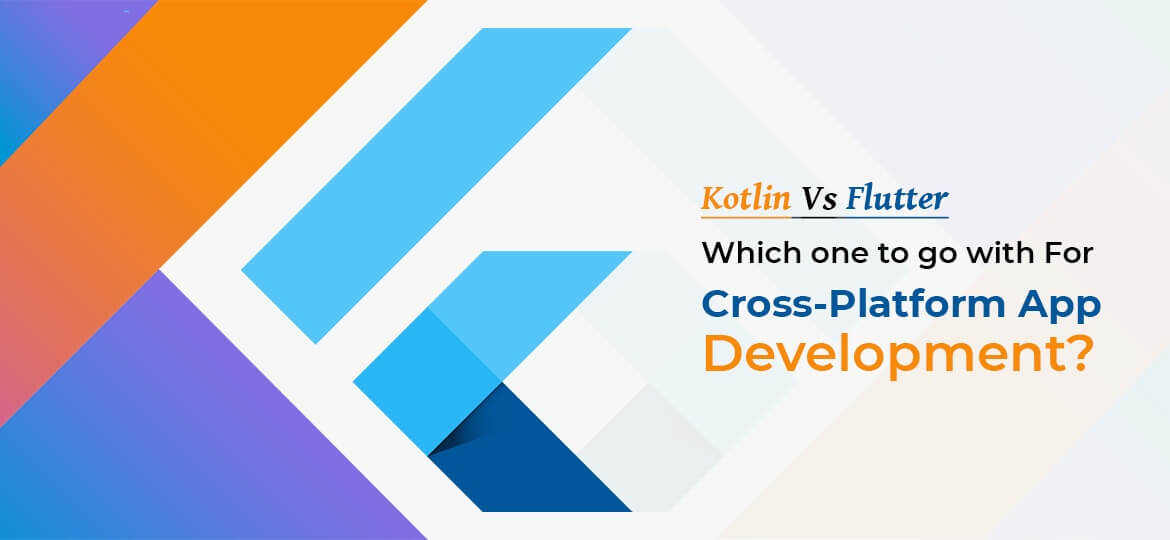
Many businesses choose to go for cross-platform app development these days. It is a great way to reach more audiences. Though choosing the right development technology is essential. When it comes to cross-platform development Flutter Vs. React Native was the first big battle. But, soon we saw a new frontier and the battle has now come to Kotlin Vs Flutter Vs React Native.
Cross-platform development gained traction. It owed to the fact that Android and iOS together make for 99% of the mobile OS market. So, why not tap into both the markets together? This encouraged more firms to find better options. And we saw the rise of a new battle of platforms in 2019-” Kotlin Vs. Flutter”.
Now, that we are in 2020, the battle of Kotlin Vs. Flutter is getting more aggressive. More companies are wondering what to choose? So, here we are with a comprehensive take on the battle of cross-platform app development.
But, before we go head to head on Kotlin Vs. Flutter, Let’s understand what are they?
What is Kotlin?
Kotlin is a powerful development language designed by JetBrains. Android has rendered complete support to Kotlin. And that is the reason it has been so popular. It has overall 10.02% of apps developed through the language. But, Kotlin is a powerful native development language.
It was recently, that Kotlin had a cross-platform development feature. Kotlin Multiplatform is a cross-platform extension of the language. It thrives on shared code. It is supported by JVM or Java Virtual Machine for development.
The code-sharing expertise of Kotlin extends to Android, iOS, Windows, Linux, and Mac. It can reduce development efforts with reusable codes.
What is Flutter?
Flutter is an efficient cross-platform development framework. It uses the Dart programming language. Dart helps to build excellent apps across, mobile, web, and even desktop. The single codebase that runs across platforms makes it an effective framework.
Flutter has capabilities to develop native UI(User Interface) cross-platform apps. It helps create apps that have the security level equal to a website. It is an open-source technology. So, there are several libraries to explore.
Flutter gained the confidence of brands like Google, Groupon, eBay, and Alibaba Group. As the Flutter development has gained traction and Kotlin is on the rise, the battle is on. Let’s discover Kotlin Vs. Flutter!
Kotlin Vs Flutter: The UX
- The most vital part of any business is consumer satisfaction. Consumer satisfaction depends on User Experience or UX of an app. A User Interface or UI creates better UX for companies. Here, both cross-platform development platforms have different ways to create UIs.
- Flutter offers a widget-based UI creating. Developers can leverage widget trees to develop excellent UI components. It is not a standard UI design method. But, it is still an effective one for the developers.
- While Kotlin offers pure UI design prowess. It allows the developers to create UI like any other native app development platform. It does not need any extensive method like a widget for UI creation.
Kotlin Vs Flutter: The Langauge
- When it comes to programming language it is more like JavaScript vs. Java. Flutter is a framework built on Dart programming language. Dart is very easy to understand language.
- It has a syntax based on the JavaScript. A firm can hire Flutter developers from India, the US, or anywhere else with JavaScript skills.
- Kotlin is a Java-based platform. Kotlin is interoperable with the Java language. So, any developer well-versed in Java can learn Kotlin.
Kotlin Vs Flutter: The Backend
- A backend service is essential to any mobile application. All the interactions between users and systems need good backend support. Without it, the system’s efficacy to handle several user requests is low.
- Flutter does a great job for the backend. It uses Firebase for effective BaaS(Backend as a Service). Firebase is an excellent backend for real-time data requests.
- Most of the backend technologies use HTTP calls for data requests by the user. But, with Flutter, you get Firebase that leverages web sockets for data requests.
- Kotlin does not use any such BaaS. it allows the developers to write their backend code. So, Kotlin enables better customizations for the backend.
Kotlin Vs Flutter: Device Support
- While they are booth cross-platform frameworks, Kotlin Vs. Flutter differ in support of Android devices. Flutter renders support to mobile, web, and desktop applications. It lacks support for different devices like tvOS, watchOS, carOS, and others.
- While Kotlin does not have any such restrictions. It can help you develop applications for different devices beyond mobile or web.
Kotlin Vs Flutter: Performance
- We often hear about cross-platform apps being low on performance. One of the biggest challenges in cross-platform development is native access. Companies develop apps that work across platforms. But, that cannot access native features.
- Flutter has greater prowess performance. It enables developers to mitigate platform restrictions. It provides excellent native access through Dart.
Kotlin is new to cross-platform development. Yet, it enables developers to write codes in the platform-specific formats. So, access to the platform related elements is not difficult.
The restriction between them lies in syntax and the use of basic language for coding.
Conclusion:
So, who is the winner? Well, we explored different aspects of both frameworks. And we concluded that Flutter remains a clear winner as of now. Flutter is easy to understand, higher on performance, and a great UI framework.
Kotlin is new to the domain and has a lot to catch up with. But, there is no denying the fact that Kotlin has the potential to fight it through.
So, if you are looking to scale your business higher. Then choose the best Flutter mobile app development services for your cross-platform app. Do you think that Kotlin is still a better option than Flutter for cross-platform apps?
Then let us know more about your thoughts in the below comments section.
Kotlin Vs Flutter: Which one to go with For Cross-Platform App Development?




 Indonesia
Indonesia
 Botswana
Botswana
 USA
USA
 Italy
Italy
 Panama
Panama




 USA
USA UK
UK Saudi Arabia
Saudi Arabia Norway
Norway India
India Australia
Australia